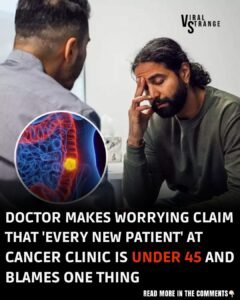Surge in Cancer Cases Among Young Adults: A Doctor’s Alarming Observation
Surge in Cancer Cases Among Young Adults: A Doctor’s Alarming Observation
In a concerning revelation, a doctor working at a cancer clinic has reported a shocking trend: nearly every new patient being diagnosed is under the age of 45. This unsettling claim has raised questions about what might be fueling such a rise in cancer cases among younger populations.
The Rising Tide of Early-Onset Cancer
Traditionally, cancer has been more prevalent in older age groups. However, recent years have seen a marked increase in early-onset cancers, particularly affecting individuals in their 30s and 40s. Among the cancers most commonly observed in younger adults, colorectal cancer is emerging as a major concern. This condition, often detected in later stages due to nonspecific early symptoms, has seen a troubling rise in diagnosis rates worldwide.
Potential Causes Under Scrutiny
While the exact cause remains uncertain, many healthcare professionals are focusing on modern lifestyle factors. Among the suspected contributors are:
- Dietary Changes: The increasing consumption of ultra-processed foods, red meat, and sugary beverages has been linked to colorectal cancer. Diets low in fiber and rich in unhealthy fats can disrupt gut health, leading to inflammation and, potentially, tumor development.
- Sedentary Lifestyles: With more people leading sedentary lives due to desk jobs and screen time, physical inactivity has become a silent risk factor for many chronic illnesses, including cancer.
- Environmental Exposures: Pollution, microplastics, and chemical additives in food packaging may also play a role in accelerating cancer development.
- Stress and Sleep Deprivation: Chronic stress and poor sleep hygiene can weaken the immune system, reducing its ability to fight off abnormal cell growth.
The Role of Early Detection
One of the key factors in combating this alarming trend is early detection. Regular screenings, particularly for individuals with a family history of cancer or those experiencing persistent symptoms like unexplained weight loss, abdominal pain, or changes in bowel habits, are essential. Medical professionals emphasize the importance of awareness campaigns to educate the public on the risks and the need for timely medical consultation.
A Call to Action
This worrying trend underscores the urgent need for collective action. Governments, healthcare systems, and individuals must work together to address the root causes of this crisis. Encouraging healthier lifestyle choices, improving access to early screenings, and investing in cancer research are critical steps to reversing this trend.
As we navigate this modern health challenge, it is crucial to recognize the role that everyday choices play in shaping our long-term well-being. Awareness and proactive healthcare can make a significant difference in curbing this alarming rise in early-onset cancer cases.